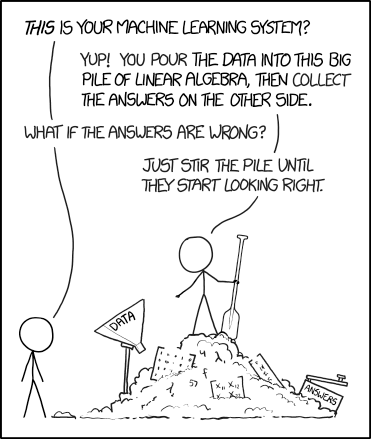03:00
1 - Introduction
Introduction to tidymodels
Welcome!
Wi-Fi network name
TODO-ADD-LATER
Wi-Fi password
TODO-ADD-LATER
Venue information
There are gender neutral bathrooms located on levels 3, 4, 5, 6 & 7
A meditation/prayer room is located in 503
(Mon & Tue 7am - 7pm, and Wed 7am - 5pm)A lactation room is located in 509
(Mon & Tue 7am - 7pm, and Wed 7am - 5pm)
Workshop policies
Please review the posit::conf code of conduct, which applies to all workshops: https://posit.co/code-of-conduct
CoC site has info on how to report a problem (in person, email, phone)
Please do not photograph people wearing red lanyards
Who are you?
You can use the magrittr
%>%or base R|>pipeYou are familiar with functions from dplyr, tidyr, ggplot2
You have some exposure to basic statistical concepts like linear models and residuals
You do not need intermediate or expert familiarity with modeling or ML
Who are tidymodels?
- Simon Couch
- Hannah Frick
- Emil Hvitfeldt
- Max Kuhn
+ our TA today, Sara Altman!
Many thanks to Davis Vaughan, Julia Silge, David Robinson, Julie Jung, Alison Hill, and Desirée De Leon for their role in creating these materials!
Asking for help
🟪 “I’m stuck and need help!”
🟩 “I finished the exercise”
Discord
- pos.it/conf-event-portal (login)
- Click on “Join Discord, the virtual networking platform!”
- Browse Channels ->
#workshop-tidymodels-intro
👀
👀

Plan for this workshop
- Your data budget
- What makes a model
- Evaluating models
- Tuning models
Introduce yourself to your neighbors 👋
Log in to Posit Cloud (free): TODO-ADD-LATER
What is machine learning?

What is machine learning?

Illustration credit: https://vas3k.com/blog/machine_learning/
What is machine learning? (2024 edition)

Illustration credit: https://vas3k.com/blog/machine_learning/
What is machine learning?

Illustration credit: https://vas3k.com/blog/machine_learning/
Your turn

How are statistics and machine learning related?
How are they similar? Different?
What is tidymodels? ![]()
library(tidymodels)
#> ── Attaching packages ──────────────────────────── tidymodels 1.2.0 ──
#> ✔ broom 1.0.6 ✔ rsample 1.2.1
#> ✔ dials 1.3.0 ✔ tibble 3.2.1
#> ✔ dplyr 1.1.4 ✔ tidyr 1.3.1
#> ✔ infer 1.0.7 ✔ tune 1.2.1
#> ✔ modeldata 1.4.0 ✔ workflows 1.1.4
#> ✔ parsnip 1.2.1 ✔ workflowsets 1.1.0
#> ✔ purrr 1.0.2 ✔ yardstick 1.3.1
#> ✔ recipes 1.1.0
#> ── Conflicts ─────────────────────────────── tidymodels_conflicts() ──
#> ✖ purrr::discard() masks scales::discard()
#> ✖ dplyr::filter() masks stats::filter()
#> ✖ dplyr::lag() masks stats::lag()
#> ✖ recipes::step() masks stats::step()
#> • Use tidymodels_prefer() to resolve common conflicts.The whole game
- Roadmap for today
- Minimal version of predictive modeling process
- Feature engineering and tuning as iterative extensions
The whole game

The whole game

The whole game

The whole game

The whole game

The whole game

The whole game

Let’s install some packages
If you are using your own laptop instead of Posit Cloud:
# Install the packages for the workshop
pkgs <-
c("bonsai", "Cubist", "doParallel", "earth", "embed", "finetune",
"forested", "lightgbm", "lme4", "parallelly", "plumber", "probably",
"ranger", "rpart", "rpart.plot", "rules", "splines2", "stacks",
"text2vec", "textrecipes", "tidymodels", "vetiver")
install.packages(pkgs)Our versions
R version 4.4.1 (2024-06-14), Quarto (1.6.1)
| package | version |
|---|---|
| bonsai | 0.3.1 |
| broom | 1.0.6 |
| Cubist | 0.4.4 |
| dials | 1.3.0 |
| doParallel | 1.0.17 |
| dplyr | 1.1.4 |
| earth | 5.3.3 |
| embed | 1.1.4 |
| finetune | 1.2.0 |
| forested | 0.1.0 |
| Formula | 1.2-5 |
| package | version |
|---|---|
| ggplot2 | 3.5.1 |
| lattice | 0.22-6 |
| lightgbm | 4.5.0 |
| lme4 | 1.1-35.5 |
| modeldata | 1.4.0 |
| parallelly | 1.38.0 |
| parsnip | 1.2.1 |
| plotmo | 3.6.3 |
| plotrix | 3.8-4 |
| plumber | 1.2.2 |
| probably | 1.0.3 |
| package | version |
|---|---|
| purrr | 1.0.2 |
| ranger | 0.16.0 |
| recipes | 1.1.0 |
| rpart | 4.1.23 |
| rpart.plot | 3.1.2 |
| rsample | 1.2.1 |
| rules | 1.0.2 |
| scales | 1.3.0 |
| splines2 | 0.5.3 |
| stacks | 1.0.5 |
| text2vec | 0.6.4 |
| package | version |
|---|---|
| textrecipes | 1.0.6 |
| tibble | 3.2.1 |
| tidymodels | 1.2.0 |
| tidyr | 1.3.1 |
| tune | 1.2.1 |
| vetiver | 0.2.5 |
| workflows | 1.1.4 |
| workflowsets | 1.1.0 |
| yardstick | 1.3.1 |
